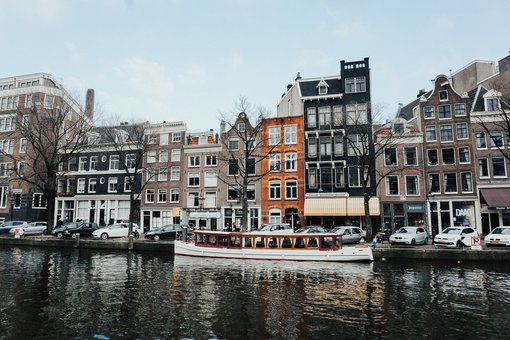Requirements to Study in the Netherlands
Netherlands

The Dutch higher education system is one of the most popular among European countries and has a high education quality. As such, the admission rate is competitive, and students must be able to meet all the requirements during the application process. The admission requirements in the Netherlands for international students are similar to other EU countries.
Here are the requirements to study abroad in the Netherlands:
What Are the Higher Education Admission Requirements?
When planning your study abroad experience in the Netherlands, one of the first things you should do is check the admission requirements. Since higher education institutions may have different admission criteria, it is important to check the requirements of the specific university.
Here are the typical requirements universities in the Netherlands expect from candidates:
- Age requirements. For candidates at the undergraduate level, it is important to be above 17 years old and have a diploma in secondary education (high school) or any equivalent qualification.
- GPA. The admission criteria for applicants with a degree may include a minimum GPA requirement of 7.0. Dutch higher education institutions can be strict regarding grades, so if applicants do not meet these requirements, they may have to increase their GPA before a deadline set by the university.
- Language requirements. Although Dutch is the official language in the Netherlands, higher education institutions may ask students to submit proof of English language proficiency to qualify for higher education studies. Dutch language knowledge is also important; however, it depends on the degree program.
- Student visa. Applicants from Non-EU countries should apply for a student visa to study in the Netherlands. In comparison, EU or EEA students have the same admission criteria as Dutch applicants. There is an exception for students from the US and Australia who do not need to apply for a visa, whoever they need to apply for a residency permit.
- Examinations (entrance, language, excellence, scholarship). The Dutch higher education admission requirements can differ for international students in terms of additional exams. Applicants must prove language proficiency through exams such as TOEFL, IELTS, and other Dutch-specific exams. Other examinations that Dutch universities may require include GRE or GMAT, depending on the study field.
What Are the Admission Criteria for Undergraduate Studies?
The Dutch higher education system requires all students applying for bachelor's degrees to submit proof of high school graduation. To make it easier for international applicants, you can check if you are eligible for higher education studies in your home country; thus, you are also eligible to study in the Netherlands.
However, this only applies to countries included in the Lisbon Convention, and some programs may ask students to take supplementary courses at the beginning of their studies in the Netherlands.
The requirements for undergraduate courses in the Netherlands can differ depending on the city and university; however, below are the main criteria that almost all Dutch universities require.
- Transcripts. Bachelor's degree courses in the Netherlands require high school diploma certificates, grade transcripts, and a study plan including all subjects and completed study hours.
- Language proficiency exams. Dutch universities accept TOEFL and IELTS for non-native speakers. Some universities may also accept Cambridge Advanced English (CAE) certificates. An NT2 exam is required for the Dutch language proficiency requirement.
What Are the Admission Criteria for Master's Degree Studies?
Having a Bachelor's degree obtained anywhere is one of the main and typical requirements for admission to master's degree studies in the Netherlands. Considering the majority of master's degree programs in the Netherlands are taught in English, applicants must provide proof of English language proficiency through the language exams that are already mentioned in this article.
Here are some of the main requirements to be eligible for a Master’s degree in the Netherlands:
- Undergraduate diploma. Depending on the higher education institution you are applying for, the Bachelor’s degree should match the degree program. That said, when applying for a master’s degree at research-oriented universities, a bachelor’s degree should also be obtained from research-oriented universities.
- Minimum GPA requirement. Applicants of master’s degree programs in the Netherlands should have a bachelor’s degree with a minimum GPA of 7.5.
- Further documents are required for admission. Transcripts of the bachelor's degree, ID and passport copies, CV, and motivation or cover letters, depending on the university’s criteria. Most universities in the Netherlands may also ask students to submit recommendation letters or references.
- Language requirements. If English is the medium of instruction in your chosen degree program, you should submit proof of language proficiency. If the degree program is entirely in Dutch, non-Dutch speakers must take the University Language Test to prove language fluency.
What Are the Admission Criteria for Doctorate Degree Studies?
The main requirement to get admission to a Ph.D. program is to possess a Master’s degree in the relevant field of study. An equivalent diploma instead of a master’s degree is also accepted.
If you are applying for a research Ph.D., you may need to go through a lengthy application process and submit more documents than you would for a regular Ph.D. program.
Most doctoral programs require language proficiency in English since it is the main language of instruction. A few degree programs require students to have language proficiency in Dutch.
Which Documents Are Required to Study in the Netherlands?
When deciding on the city and university of your choice, one of the final steps is to check what documents the institutions require to submit and try to gather them as soon as possible to apply in time. The number of required documents can vary depending on the nationality of the applicants, the institution, and the degree program.
Here are some of the main documents international students need to study in the Netherlands:
- Previously obtained diplomas. Depending on the degree program you are applying for, you need to submit any diplomas you have already received. Bachelor's degree programs require a high school diploma, and more advanced degree programs require a bachelor’s or master’s degree.
- Academic transcripts and study plans. Most master’s degree institutions in the Netherlands require students to submit study plans, subjects, and hours completed in their bachelor’s degrees.
- Language proficiency proof. Dutch higher education institutions require students to submit English language proficiency proof for the majority of the degree programs. However, if Dutch is the medium of instruction, the university requires an NT2 Dutch language proficiency certificate.
- CV and letters of recommendation. Letters of recommendation are important when applying to a Dutch university and usually require at least two recommendation letters. They should be handwritten and signed. Most universities in the Netherlands also ask for a CV (preferably in English).
- Motivation Letters. The Dutch higher education institutions strongly recommend students spend the most time on their motivational letters in their admission applications. The admission offices focus on the applicants' motivation letters to see their main motivation for applying to that particular university.
- Financial proof. Some universities in the Netherlands may ask students to submit evidence of sufficient funds for the entire degree program. It is recommended that applicants can spend at least €800 per month when studying in the Netherlands.
- Visa application form. Non-EU students should submit a Visa application form to the Dutch consulate or embassy in their home country—the visa fee costs around €174. You should also check with the consulate/embassy for additional documents to submit with your application form.
- Health insurance. Dutch higher education requires all international students to attach their health insurance plan proof in their application. The health insurance plan should include the entire stay in the Netherlands.
- Biometric information. To be eligible for a residency permit once you arrive in the Netherlands, you must include biometric data, including identity proof such as a digital picture and fingerprints.
Higher education institutions in the Netherlands require an official translation of previously obtained diplomas, transcripts, and other official documents. The Netherlands university accepts official Dutch, English, German and French documents. Otherwise, you should submit the official translations alongside the documents' original versions.
*Dutch universities may ask students to undergo an admission test in addition to the required documents if they believe they may not be fully qualified for admission.
What Are the Language Requirements for International Students?
The Dutch higher education system includes degree programs in Dutch and English. International students must submit proof of language proficiency in either or both languages depending on their field of study. However, a minimum level of English language proficiency is required whether or not English is the medium of instruction.
Universities in the Netherlands accept the following Dutch language proficiency certificates:
- NT2 Test scores or
- The Dutch TUL intermediate exam scores.
Universities in the Netherlands accept the following English language proficiency certificates:
- TOEFL: A minimum of 55 points for paper-based and 213 points for computer-based.
- IELTS: Minimum score of 6.0.
- PTE Academic (Pearson English Language Tests).
- Other. Some universities may also accept other language proficiency tests. However, you should check with the particular university. Additional exams that the Netherlands may require include the GMAT and GRE.


